I’ve never quite understood why the Gun Club, one of the all-time great Los Angeles bands, had an estranged relationship with their city of origin. It seems to me no local critic or serious music fan can deny their impact on L.A.’s music legacy. One of the great cult bands of rock music, the Gun Club were arguably the most important band to rise out of the aftermath of Hollywood punk’s first wave. Their fiery music fused a few quintessential strains of L.A. rock at the time: the poetic death trip of Jim Morrison and Darby Crash; the fascination shared by X and Redd Kross for the seedy underbelly American culture; and the reverent plunder of traditional American musical forms, most obviously blues and country.
The term “blues punk” may forever be associated with the Gun Club, but except for a few tracks on their 1981 debut Fire of Love, the Gun Club never really drew musically upon “swamp blues” the way their frequent comparisons to the Cramps (with rockabilly) or the Blasters (with 50s R&B) would suggest. Nevertheless, this reputation as well as the L.A. circles they traveled in put them at the front end of the whole “roots revival” that re-energized underground rock in Los Angeles and very quickly other strongholds across the globe, from London to Berlin to Sydney, even if (to their great credit) they were maybe the least shackled of this cohort of bands to the musical idioms and aesthetic conventions of roots music. As L.A. bands continue to draw musical sustenance and lyrical inspiration from the the well of blues, country and blue-collar folk, the names of the Gun Club and frontman Jeffrey Lee Pierce are embossed on the bucket.
Below: a playlist of 22 songs by the Gun Club and Jeffrey Lee Pierce.
So what gives? How come “no one gave two shits” about the Gun Club in L.A., as guitarist Ward Dotson declares in the 2008 documentary Ghost on the Highway: A Portrait of Jeffrey Lee Pierce and the Gun Club? I think there’s two answers to this question.
First, to some degree, the issue is relative. L.A. liked the Gun Club well enough, and by now the band has been given their proper due, but, sure, local fans and media at the time were maybe distracted waiting for X (“the last American band”) to achieve its commercial potential, or growing understandably infatuated with the bands and sounds of independent label SST Records. What made the issue salient for the group was the rare luck of scoring a great New York Times review for Fire of Love before they had ever toured outside of L.A., which set up critical and fan anticipation for the Gun Club that the band successfully exploited for the rest of their career.
He’s hardly a reliable narrator, but I’ll let Jeffrey Lee Pierce explain the situation in his own words (All JLP quotes in this essay come from his memoir Go Tell the Mountain, published posthumously in 1998 on 2.13.61 books; all quotes from other people come from the Ghost on the Highway documentary):
When we put out that Fire of Love record, it got really popular in Boston and New York just from the release and so there was enough of a demand for us to tour. The thing is, the record was doing well there and everybody was waiting for somebody to do something different for a change. We weren’t new romantic and we weren’t like Echo & The Bunnymen or some shit, and we weren’t like some punk band, so we came out and we were doing this weird thing. And everybody on the east coast was just ready for that. So everybody was just going crazy. Every set we did there was a complete mess. So we toured and made money, in fact, which is weird for a first tour. It’s rare for bands to do that. We didn’t really do anything. We were just a pretty much ignored Los Angeles group, but the thing just got really popular on the East coast. The East coast kind of invited us so we went there and we could headline and play places much bigger than the Whiskey A Go-Go and sell them out. We decided to go where they wanted us and so we started spending more of our time there. It was hard because when we came back, we were supposed to go to [independent L.A. label] Slash Records for another deal, but then I got this other offer which would have based us in New York and I thought that tactically the best thing for the group to do would be to be based in New York at that particular point because the group had so much more attention there.
Also, we were one of the first bands out of L.A. to hit overseas. But there was a backlash. The main reason was because we were never a favorite band in L.A. We wouldn’t draw more than 200 people on a good night. Suddenly, New York and Boston discovered us. And there’s always been a rivalry between New York and L.A. Traitors already in one direction, and then off to Europe and the U.K. Imagine what it looked like to people over there. We were no better than defecting communists. Might just as well have taken a walk over the wall at Berlin and handed over the documents.
This passage reveals the ambition and opportunism that contextualize the relative neglect the group felt in L.A. The Gun Club always had their sights on going as far as their music would take them, so when the opportunity presented itself, they left and rarely looked back, basing themselves next in New York to record their inspired if poorly recorded second album Miami on Animal Records, a vanity label run by Blondie’s Chris Stein.
But as much as success, an innate compulsion toward movement and travel also motivated the Gun Club, which points toward the second part of my answer. Consider the careers of two key band members:
- Kid Congo Powers (born Brian Tristan) grew up in La Puente and with Jeffrey Lee Pierce formed Creeping Ritual, the first incarnation of the Gun Club, before getting snatched by the Cramps (with JLP’s blessing). After returning to the fold in 1983 for several albums, Kid Congo joined Nick Cave’s Bad Seeds, another notorious group of international bohemians and degenerates, then pursued several lesser-known projects leading to his most recent group the Pink Monkey Birds (nominally based in Washington, D.C.).
- Patricia Morrison (born Patricia Rainone) grew up in Whittier and played in Hollywood punk band the Bags alongside future Gun Club drummer Terry Graham. She joined the Gun Club in 1983 with Kid Congo to record and tour for The Las Vegas Story, an album that captures the full roar of the globe-trotting Gun Club. Following the band’s disintegration later that year, Morrison joined the Sisters of Mercy and then the Damned, eventually marrying and having a child with Damned frontman Dave Vanian.
As this suggests, the Gun Club attracted a certain kind of person with a penchant for seeing the world one dark, seedy nightclub at a time. That lifestyle didn’t agree with every member, most notably Dotson and Graham; their differences with Jeffrey Lee Pierce had several causes, but it’s telling that the rest of their careers are associated with Los Angeles (e.g., Dotson’s bands the Pontiac Brothers and Liquor Giants). The international ethos of the Gun Club would become fixed in the band’s final and most solid line-up — “the greatest band that I ever worked with,” Pierce said (pg. 52), featuring British drummer Nick Sanderson (ex-Clock DVA) and Japanese bassist Romi Mori.
Still, the Gun Club was always Jeffrey Lee Pierce’s band. “He was the star of the show, and we all just jumped on and off,” says Terry Graham. “It was Jeff’s musical misery tour.” To understand Pierce’s ambivalence toward Los Angeles requires looking further into the particular origins Jeffrey Lee Pierce. How his rootless worldview came to be is a very Los Angeles story, I think, even if it left him to travel and finally die far from home.
Like so many Hollywood punks, Jeff Pierce came from the L.A. suburbs. He was born in 1958 and grew up in El Monte, an inner-ring metropolitan municipality of L.A.’s San Gabriel Valley in the process of racial transition from white to Latino and Asian. He was the first child of a bi-racial marriage. His white father, a Korean War veteran, was a union organizer; his Mexican mother Margie stayed at home raising Jeff and sister Jacqui. Margie spoke Spanish, but evidently the Pierce household was predominantly Anglo in language and lifestyle.
In Southern California, questions of identification as ‘Latino’ can be complex, given the massive population size, phenotypical diversity, and long history of the population who can trace its lineage to the pre-Yankee Spanish-speaking peoples of the Southwest. I identify with this part of Jeff Pierce’s story: my own Mexican grandfather and grandmother were born a century ago in El Paso, Texas, and Jerome, Arizona, learned Spanish as their first language, worked as an East L.A. policeman and a Fairfax District (West Hollywood) jewelry shop assistant, and raised my father and aunt first in (Latino) Alhambra and then (Anglo) South Pasadena, before finally retiring as Reagan Republicans among other (Anglo) police retirees in a small coastal town of Central California. ‘Mexicanness’ comprises a diverse and sometimes unexpected range of experiences in neighborhoods where Spanish is a predominant language and racial intermarriage happens often enough, but it’s also a confining label that Anglo institutions and neighborhoods place on people and neighborhoods of visible skin characteristics and ways of life. Thus, you can grow up Mexican by biological descent (at least defined by America’s one drop custom) and, by chance of skin color and class status, not “be Mexican” in the eyes of outsiders.
All of this is to say, I think Jeff Pierce grew up both insider and outsider to Mexican identity. To strangers he didn’t ‘look Mexican,’ which allowed him to travel in circles of European/White privilege and not question his own ability to pass. At the same time, he experienced an instability of identity, which left him hungry for the sense of community and solidarity in the face of oppression that ‘Mexicanness’ symbolized at this point in L.A. history. The kind of Mexican identity he crafted over his lifetime is illustrated in this somewhat rambling passage from his memoir, which starts with the appearance of Tito Larriva to record the Gun Club’s first album:
Little did [Slash Records’ Bob Biggs] know that my fellow Latino, Tito Larriva, had already arrived on the scene. Recording for the Plugz’ Fatima label, we already had six tracks for our debut EP. IRS Records had been doing good business with EP’s and Fatima followed suit. I also enjoyed the comfort of an all Mexican label, I was raised by a Mexican mother in El Monte and had spent my entire life in her family environment. I was even briefly in a gang at Valle Lindo Junior High School. I understood Spanish and spoke a little. Tito’s label consisted of The Plugz, The Brat and the Gun Club. Indeed, even now I still find Anglo-Americans strange and foreign. I have a penchant for black haired girls and can deliver a fearsome street rap. It’s all a part of my Mexican upbringing. The girlfriends of my youth were all either Mexican, Korean, Japanese or Black. My first kiss was with a girl named Sandra Gutierrez, and my first tit game was with a girl named Darcy Kimura. Miss Kimura’s pearly little breast in my palm is still a memory I cherish. The Mexican girls were often inaccessible — property of the cholos. But the Asian girls were excellent students, and often lonely and as inexperienced as I was. So I continued to see Miss Kimura until high school split us apart (she went to Rosemead; I went to Mountain View).
Later in my life, that comfort was always still there. Among Latinos or Asians, I always felt quite at home. I even experienced some militancy when my family moved to the San Fernando Valley, being unable to get along with the wealthy Anglo kids. I was always reading Eldridge Cleaver or Huey Newton, supporting the Viet Cong, who were my idols. Needless to say, I didn’t have many friends.
The Pierce family relocated to the largely white Granada Hills, then part of the outer suburban edge of L.A.’s San Fernando Valley (“the Valley” to the rest of the world), when Pierce was 15 years old. Here his outsider status followed the familiar arc of the bohemian — a fertile soil for his imminent punk career. Jeff devoured the literature of William Burroughs, Joseph Conrad and other modernists who shared the critical, horrible truths that came with rejecting society and immersing oneself in debauchery. He sat in acting classes at the Lee Strasberg Theatre and Film Institute in West Hollywood and considered acting as an artistic pursuit. That would pass, but a love of performative deception would remain; his memoir marks the appearance of his first “pen names and alter egos” (Mika, Mikki, Michi, Michiko, Maki, and Chili B) to 1975-79. His alienation from the affluent Valley teens eventually took visible form. Pierce always kept a certain amount of baby fat up through the mid-80s, something that in his early photos (before the peroxide) seems to place him along the edges of whatever group he might be seen with.
When Hollywood’s glitter scene gave way to punk and new wave’s visual transgressions, Pierce delighted in the verbal and performative shock that dying his hair and cross-dressing offered:
By Halloween that year [1981], Kid [Congo Powers] and I were a regular couple… The next night was Halloween and Rosemary Patronette rove me out to the Valley where The Cramps were playing. Kid was with us. We were dressed as Rita Moreno and Marilyn Monroe from Hell. Kid and I were always looking for some excuse to put on women’s clothes. Phil Alvin as backstage complaining to Lux Interior about how horny he was.
Lux simply pointed to us and said, “There’s plenty of girls around, Phil. Look at those two lovelies there.”
Phil then walked up to me and said, “If I didn’t know that was you, Jeffrey, I swear I’d fuck you.”
“I’m not a cheap girl,” I replied. “Ask Rita, not me, you dreadful man.” At which point I turned a flattened rouged cheek and slammed the door behind.
A comment from a peer, Theresa Kereakes (now a widely-published photographer) is worth noting:
THERESA KEREAKES: I think especially with the lipstick and the, sort of, strange male attempt to look like Marilyn Monroe — kind of an homage, and tribute — to his fascination with Debby Harry… He was almost the equivalent of your gay best friend.
Just how queer was Jeffrey Lee Pierce? In fact, his memoir paints a picture of him as a rampant womanizer, a taste for garish drag notwithstanding. Also telling is his silence about the sexuality of Kid Congo Powers, now a very out queer musician. Without knowing anything about the timeline by which Kid Congo came out, I find it curious that Pierce writes nothing about his longtime friend’s sexuality, which he surely must have known about. Was Pierce simply being discreet about his friend’s sexuality? If so, why digress about Phil Alvin’s horniness?
I think these patterns suggest the limits of the iconoclastic Pierce’s self-understanding. Unafraid to look down the depths of human despair and depravity, he nonetheless lacked a language to understand the studied, sometimes contradictory construction of personal identity. Here I can’t help but think again about his status as Latino/Anglo biracial. Admittedly, the term “biracial” is rather contemporary, not something something Pierce (or many others at the time) would have reached for. Note how his friend explains his situation in hindsight:
THERESA KEREAKES: One of the first things that Jeffrey ever said to me was, “What are you?” And I thought that was a little odd. And then he said to me, “Well, I’m half Mexican.” And I didn’t think he looked half Mexican. I told him I couldn’t tell, and he said, “We’re both half-breeds”… The idea of being a half-breed and not fitting in with either/or — really, sort of polarized culture of what our halves were — seemed to be, at least you know from where I stood, a constant theme in Jeffrey’s struggle and probably why he was such an intense artist.
As this suggests, Pierce externalized his internalized contradictions, set in motion at the racial and metropolitan crossroads of Los Angeles, into his art. The ugliness of racial anxiety, hatred and obsession were preoccupations of the Gun Club’s early work. Their attraction to “swamp blues” may have been more important to the group’s thematic symbolism than to their sound. On the two album covers Fire of Love, the now-politically incorrect imagery of Southern voodoo cults drew upon a transgressive yet historically informed take on American culture.
Despite my romantic fantasies, the most common subject remained low-life Amerika. It appears in the early songs. I was filled with anger, hatred and sexuality. Dejected, disbelieving and disappointed. In a sense, a punk. Although out of uniform.
I was in the early stages of forming a band which had not yet played out. A friend, Don Waller, said something that still echoes in my ear.
“Tell them what they don’t want to hear.”
So, as a rule, all of the lyrics of the early Gun Club dealt with unpopular subjects, namely: Sex, Murder, Drugs, Insanity, Desperation, Loneliness, Suicide and just plain Bad Vibes. There is also a fair amount of Self-Destructive Serial Killer and Racist War Criminal mentality portrayed. Much of this was based on people I had either encountered or read about.
This symbolism also informed a new stage persona, Jeffrey Lee Pierce the “refugee Civil War soldier,” as his biographer explains:
RYAN LEACH: You know, almost like everyone was talking about Vietnam in the late 60s, Jeffrey was talking about the Civil War in the early 80s. So you had Jeffrey Lee Pierce as a 22-year-old kid from the Valley [sic], no nexus to anything involved at that time, and he just wrote these great songs about, you know, riding on a black train. You know, this kid didn’t ride on a black train!
Of course, Pierce also rode a black train outside of his art, most notably with his drug use. He’s rather sanguine about his substance abuses in his memoir, but what he fails to note is how his descent into hard drugs really began only after he wrote songs such as “She’s Like Heroin to Me.” In the documentary Ghosts on the Highway, Ward Dotson recalls Pierce seeking out heroin connections for the first time while on tour, while Dotson’s replacement Jim Duckworth describes Pierce eagerly absorbing the heroin culture that Duckworth was already familiar with.
Pierce also turned to travel to explore the human condition and, in the process, his own identity. A pre-Gun Club obsession with reggae took him to Kingston, Jamaica, ostensibly to research the genre that he was writing about in L.A. zines. Kid Congo recalls that Pierce “mostly got hustled” and came close to getting hurt, but he was undeterred. On tour or in the downtime, the Gun Club offered Pierce the opportunities to travel to Europe, North Africa, Asia and elsewhere.
JOHN DOE: He would keep himself inspired. I think that was part of the romance with Romi, and part of the romance with Japan and Vietnam, and that Far Eastern thing. He had the element of adventurer in him and did promote that mythology. And I thought it was brave to do that stuff. I didn’t go to Vietnam, you know, hitchhiking around or taking trains, or whatever he did.
DAVE ALVIN: Guys like that, they go to Southeast Asia, they’re not going really to look at ancient ruins in Angkor Wat; they’re going for drugs.
Maybe he was in pursuit only of drugs sometimes, but his travels allowed him to achieve a condition of stateless moral freedom — a rootless cosmopolitanism that he idealized:
All my life, people have been pushing me around. Mr. & Mrs. DRILL SERGEANT and their 50’s Korean War ways, I will immediately go the other way. Authority, I do not respect. Unless it’s the respectful authority of a street educated human being. The REAL PEOPLE. Assholes talking about the program, when they have never been there. I will live as I wish, unless somebody can show me something I don’t know. Shove your philosophy up your ass. War! Is in the streets! For the Blacks, the Mexicans, and the Japanese! We can understand each other. What’s wrong with you?
A former junkie without hepatitis is lucky. A junkie without track marks is a yuppie. You’ll never really understand life until you live it near death. Crackk! What does that sound mean? Death, you fuck.
Pierce’s obsession with the Far East deserves special attention. He spent much of his last ten years in Asia, before his life reached an inglorious denouement in a medical facility in Salt Lake City. Asia also gave form and fulfillment to the longings he first felt back in El Monte, starting with his romantic life.
Speaking of which, there’s no delicate way to put this: Jeffrey Lee Pierce the self-identifying Latino had a thing for Asian women. The high school tit game with Darcy Kimura was just the beginning of a fetishizing attraction to the physical and cultural attributes of Asian women. It would be easy to write this off as the Orientalism scrutinized in critical race and ethnic studies, except to note how much his obsession provides the hidden backstory to the Gun Club’s career. As his memoir notes, a “disastrous relationship” with a Japanese-American girl from Tacoma provides the inspiration for “Promise Me.” Jeffrey Lee helped form the long-forgotten L.A. death-rock/cow-punk group Tex & the Horseheads, fronted by his Asian girlfriend Linda “Texacala” Jones; notes Horsehead guitarist Mike Martt, “It was funny because later on I realized Jeffrey had a penchant for girls who looked exactly like Tex.” And it reached its peak with Japanese bassist Romi Mori, whose roles as bassist and romantic muse to Pierce drove the entire last half of the Gun Club’s career.
It’s worth pausing here to consider those final three or so albums (I’m never quite sure how to categorize the “Divinity” EP or the In Exile compilation). They tend to be overlooked by many Gun Club fans because they display neither the “roots” sounds nor “Bad America” lyrical themes that the band is associated with. Too bad, because these last albums comprise a powerful, emotionally and musically moving body of work, featuring some of Pierce’s most affecting vocals and impressive guitar work. Mother Juno is especially strong — easily one of the best albums of 1987, even though the choice of the Cocteau Twins’ Robin Guthrie as producer confused many listeners. (Ask Rick Rubin how such unexpected choices of producer have become the norm today.) 1990’s Pastoral Hide & Seek is maybe more of a mixed bag, with a strong batch of songs treated to the most ‘alternative’ mix (no guitar distortion!) of any Gun Club record.
Personally speaking, 1992’s Lucky Jim is the most striking record in the Gun Club oeuvre. Kid Congo had left at this time, unable to commit to an increasingly erratic and unhealthy Pierce, leaving the latter to handle all the guitars. He summons some beautiful sounds (words I’d never before associate with Gun Club recordings) from his guitar, be it the haunting acoustic strums of “Lucky Jim” or the chiming arpeggios of “Blue Monsoons” (written by Mori) Unexpectedly, Lucky Jim includes some convincing electric blues — not the crazed slide guitar of the band’s early era, but a warm, full-band treatment you might hear in a Chicago bar. The album name and title track reference another Pierce alter ego, a post-colonial roamer adrift and unaccounted for in the Vietnam that Pierce had begun to explore before hepatitis brought him low:
Not so lucky though. The Australian named Jim has disappeared now. His parents know nothing of him. They don’t want to. He worked for Telegraph, Co. He used to live singing “Wichita Lineman” at all times of the night in the streets of Saigon, 1991…
I will go back someday. Vietnam is God’s land.
Lucky Jim is an album of unrequited love, betrayal, anger and remorse — sentiments that sustained his wanderlust in the final years. A track that particularly stays with me is “Kamata Hollywood City,” which recalls his attraction to Mori’s best friend, with whom he lived, at first platonically, in a 1987 spell in Tokyo.
This was my second trip to Tokyo. Kayoko joined us this time. As usual, Romi spent most of her time at home with her parents (where I could not stay). Instead I stayed with her best friend Kayoko. Kayoko was supposed to take me back and forth from the city. Entertain me. Feed me. Translate.
Our new residence was Kamata. I had tried hard all winter and succeeded to stifle my feelings for Kayoko, but after a couple of weeks, it was becoming a struggle. Once we walked together through Machida, and she wove a humorous story about our other friend Yuko.
“Yuko is tired of being married to English,” she said.
“What does she want?”
Somebody wild. Like American. Like you. Or Australian like Nick Cave.”
“Why doesn’t she go find one?”
“She is married, but she like someone of your style.”
“Like I prefer yours,” I mumbled.
“What?”
She didn’t quite understand. I was lucky again. As always happens with me, the truth slipped out. I hardly saw Romi at all. Only on outings to Kamakura or Yokohama did she ever join us and we were almost never alone. I spent a lot of time biting my tongue and drinking myself senseless, trying to forget the very real dilemma that I was obsessed with my roommate.
After drinking bouts all over Tokyo, Yokohama and Kawasaki City, I would wake up hungover in Kamata, senses distorted, listening to the Korean children below our apartment screaming and shouting in the overcast morning. Clothes from the balconies hung like flags. The river was muddy and grey. Smoke belched on the other side. A sort of Japanese ghetto scene. The images that greeted each morning would stay etched in my memory for an eternity, because I had already written them.
Pierce and his companion would finally consummate their attraction, thereby pushing Mori away permanently (even as they continued to work together for another five years) while losing Kayuko at the same time. Having lost the two final great loves of his life, Pierce exiled himself for the rest of his life. After travels to Vietnam, he would return to Japan once more, now in Osaka, to pursue a strange musical project (never recorded!) in pidgin-Japanese rock-rap. His memoir ends with bitter anecdotes, seemingly ripped from the pages of a Graham Greene update, of how this project (with erstwhile collaborator Johnny Depp!) came to naught:
So I went back to working with Johnny. All this time [1995], I was running out of money, desperate to do something with Japan. But the Japanese don’t understand it. Nor do most Americans. Then came the day I got sick, and went again to the hospital. Out to meet me came Keith Peterson of my own Embassy. A D.W.A. (Diplomat With An Attitude). After he admitted he knew all about me, I rebelled and told him to “Fuck Off” like the old gang-banger I was.
He said, “Japanese don’t people like you and Johnny Depp around here.”
I said, “Well, I’m also experimenting with Japanese language through a Rap Music style and D.J.’s as communication between the two worlds.”
He said, “Japanese wealth does not want more Black Culture.”
I said, “Why? They like the music. Africans are PEOPLE YOU KNOW!”
He said, “You are trying to explain something you cannot explain in L.A.”
I said, “I want to experience and learn Japanese bottom level up.”
He said, “Yes, but stay down very low. It’s interesting.”
I said, “Well, I’m out of money.”
He said, “Catch your flight at Narita, Terminal 3.”
That night I went back to Ebisu [Osaka]. The Milk Bar. Two Americans in three-piece suits threatened me. Said they didn’t want people like Johnny & me fucking with “their” women. They obviously were executives. They also said that I was so rude. Dancing on the floor, describing the movements of “good sex.” An American executives’ personal playground, I observed. Tramps like Mr. Depp and me could maybe have changed their girls’ minds. Selfish protectionist bastards. Now I know why we always fail as Americans to open Japanese markets, because Reagan raised Americans work for the Japanese. However, the Japanese kids are bored with it. They are our heroes. Always support the Japanese feminist, and the boys (who have it harder). And especially the woman, who, in Japan is really the much stronger of the race. This country is too smart for its own good.
Pierce’s self-imposed exile ended without clean resolution. A lifelong attraction to geographic and cultural others led him along in those final years with the promise of drugs, sex, and truth about the human condition, yet it could never resolve the anomie found at the origin of his life back in L.A. It’s uncomfortable to read in Go Tell the Mountain his striving toward self-understanding, so wrapped are these accounts in bluster, futility and dissipation:
A time would come where I would be speaking good Japanese, but they would forever close the door on me. I would later come to experience real racism first hand and end up in hip-hop bars full of Africans and African-Americans looking for an escape from hard-ass Tokyo bigotry.
I didn’t love that country or any other anyway. I AM a country! And that’s where my bitches come from. Pass the Kikkoman sauce motherfucker: Its [sic] Nampa Time! Next appointment, please!
I prefer to remember Jeffrey Lee Pierce’s years of exile through “Kamata Hollywood City.” Unexpectedly subdued and reflective, it speaks a truth about his own failures (here to a fictionalized wife) through an idiom he has greater command of than literature. The listener is left to ponder the unexplained title that juxtaposes downtown Tokyo and Hollywood; the latter isn’t manifest in the lyrics, but as a geographic emblem of Pierce’s beginnings, it suggests the ways that Los Angeles haunted Pierce’s journeys through the end of his life.

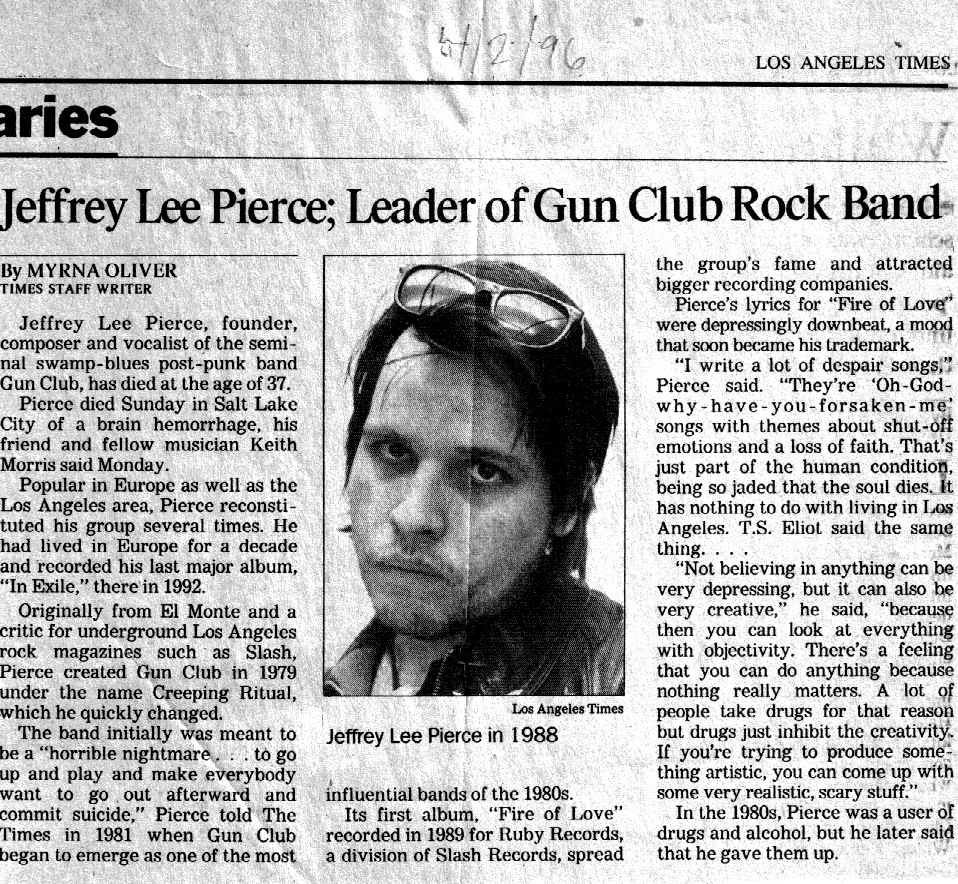

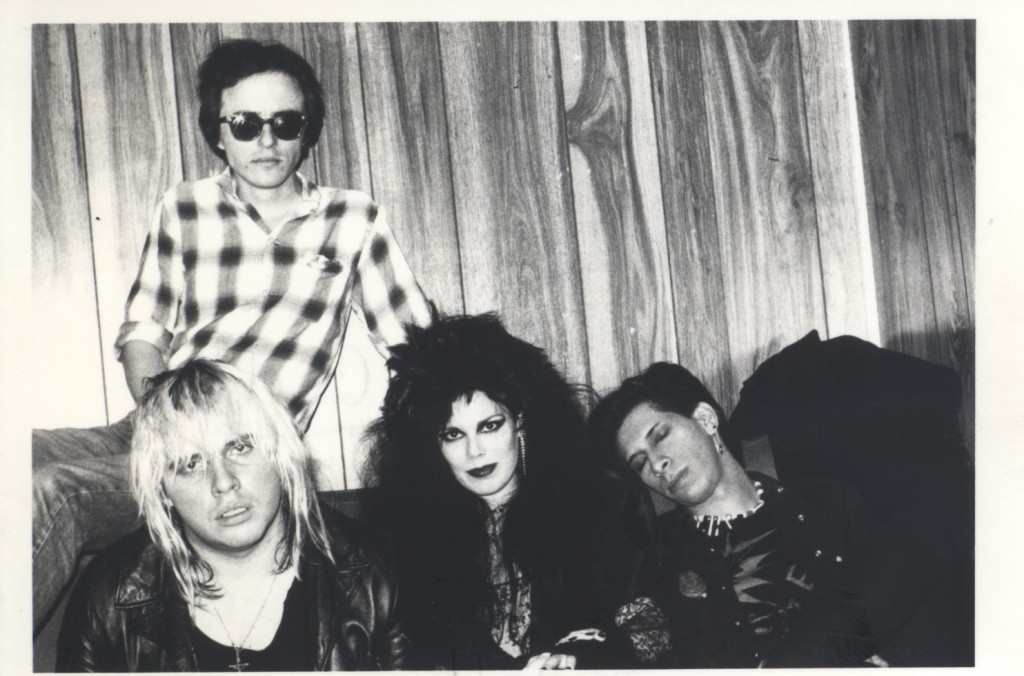
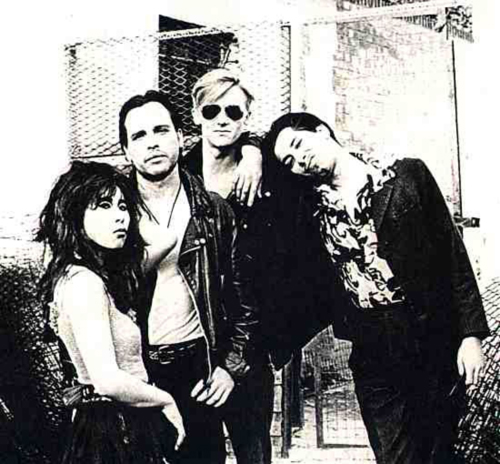
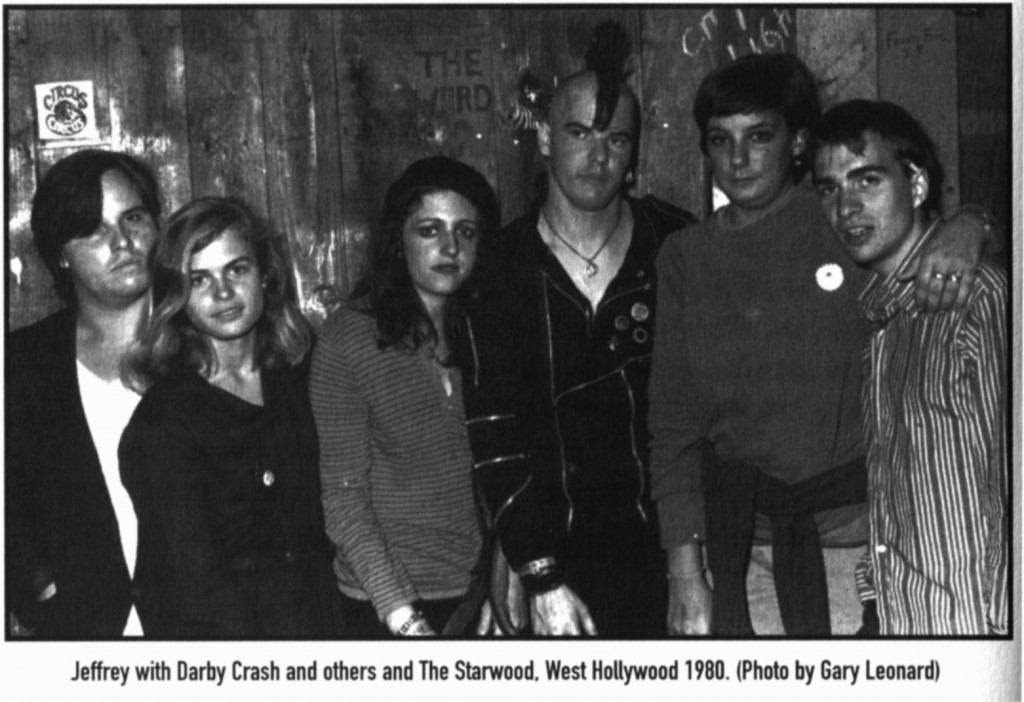
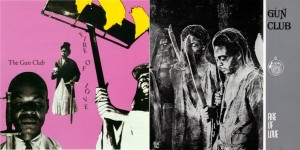
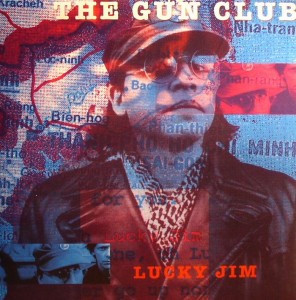
7 comments
Munky Squirrelbottoms says:
Jun 24, 2015
Thanks! This was great.
i know tex says:
Jul 31, 2015
texacala jones (previously known as linda yacoubian) is not asian. she is of armenian descent.
.
Punkmemory says:
May 9, 2016
New Rose records (7, rue Pierre Sarrazin 75006 PARIS) Now closed
Not Red Rose…
Original pink sleeve (left), green flames is on Ruby (Ruby / JRR 102 Us), not Slash.
Here the Slash reissue :
http://rateyourmusic.com/release/album/the_gun_club/fire_of_love_f9/
Nadir says:
Sep 26, 2019
Thanks for the article, very nice read indeed
Islayman says:
Apr 9, 2020
Enjoying this article, with Gun Club playing in the background, in 2020 in the midst of the Covid-19 dystopia of the United States. Thanks.
Sara Holme says:
Dec 19, 2020
We miss you JLP x
BV Rogers says:
Feb 6, 2021
Really enjoyed this piece, some good track recommendations too. Thank you.